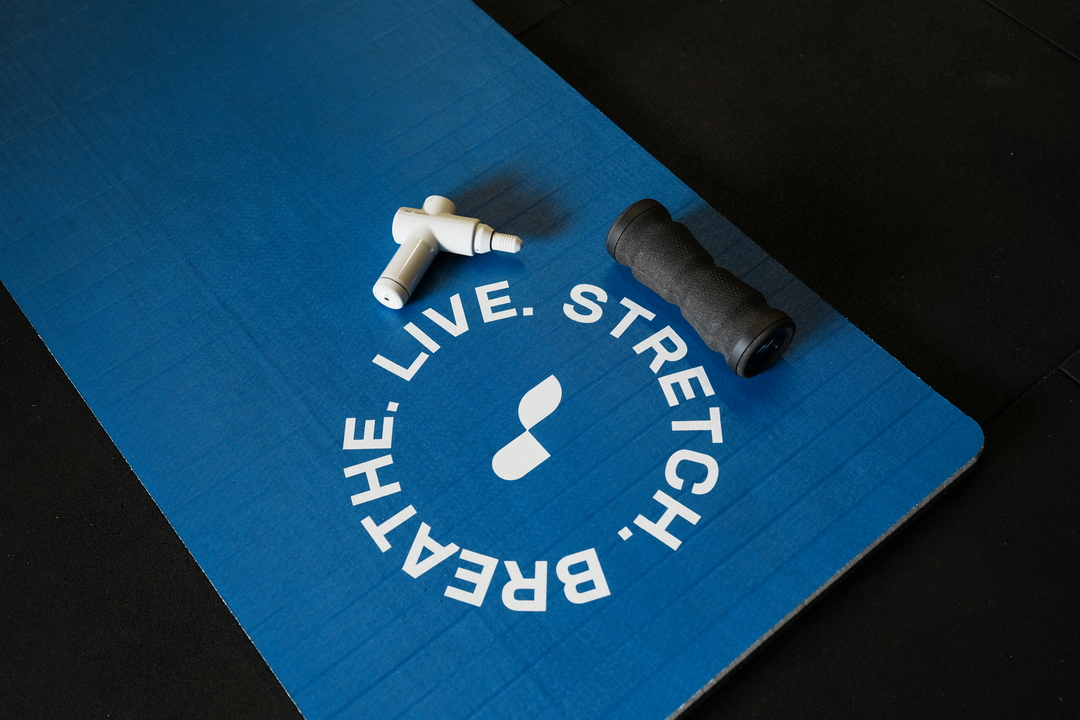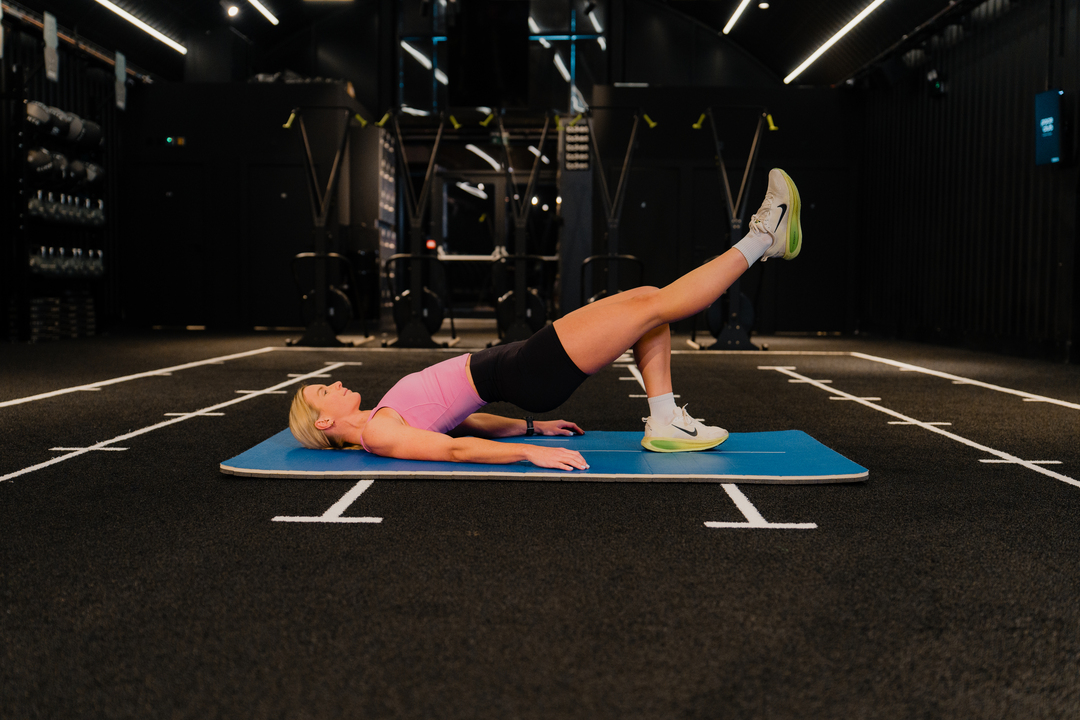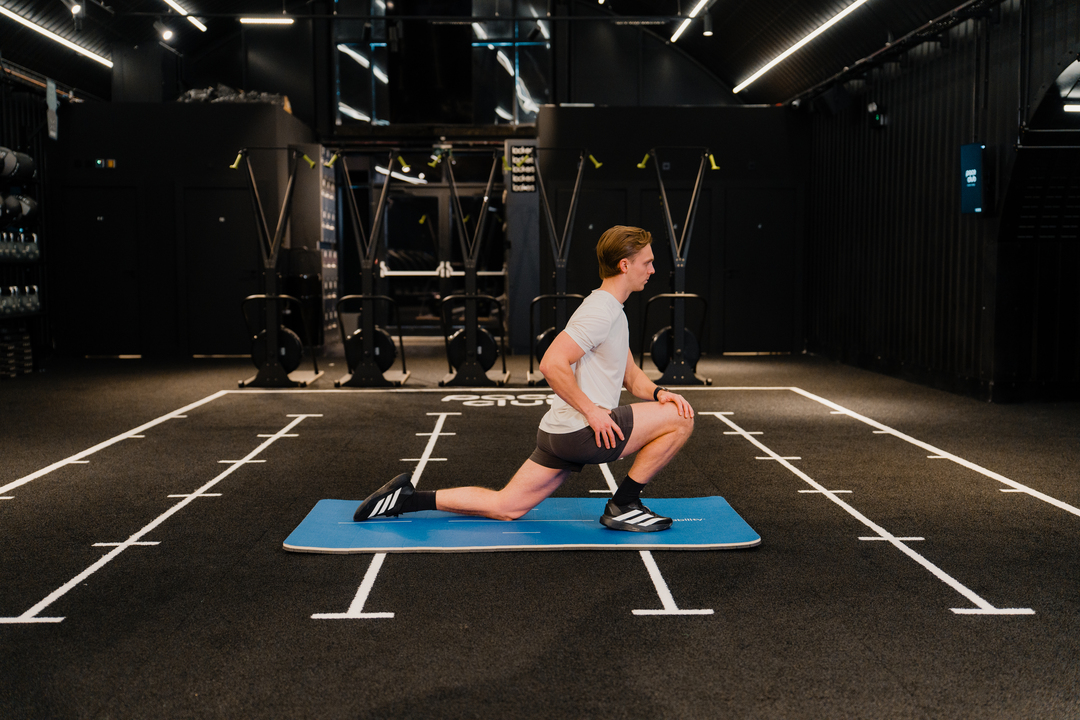After an intense workout, it’s normal to feel sore. But when that soreness lingers, it can derail your training plans, making it challenging to get back to the gym, let alone tackle another challenging workout. The good news is that there are ways to help ease muscle soreness after exercise and get you back to your training routine faster. One of the most effective methods is nutrition, specifically eating the best foods for muscle recovery. Alongside proper nutrition, incorporating some of the best recovery tools for athletes—like foam rollers, massage guns, or compression gear—can further enhance your recovery process. This article will explore the best foods for muscle recovery and how they can help you recover faster, feel less sore, and get back to training stronger, so you can build muscle consistently without setbacks.
One of the best ways to optimize your recovery and get back to training is using Pliability's mobility app. With this app, you can access targeted routines created by some of the world’s best athletes to help you recover faster, reduce soreness, and get back to training stronger.
What Should You Eat for Muscle Recovery?

While stretching and cooldowns support recovery, nutrition plays a critical role in muscle repair and strength-building after exercise. According to sports dietitians Kelly Jones, RD, and Mackenzie Burgess, RDN, intense workouts cause microtears and muscle stress, signaling the body to initiate healing.
Consuming the right balance of macronutrients, protein, carbohydrates, and healthy fats supports:
- Tissue repair
- Replenishes glycogen stores
- Helps reduce inflammation
Equally important, micronutrients like vitamins, minerals, and antioxidants enhance recovery and inflammation control. A well-rounded nutritional approach is essential for optimal post-workout recovery.
Muscle Recovery Foods: What to Eat After a Workout
When considering what muscle recovery foods to eat after a workout, board-certified sports dietitian Roxana Ehsani, RD, says that the two most essential macronutrients are:
- Protein helps repair and rebuild muscle tissue. Ehsani recommends aiming for 20–30 grams of high-quality protein post-workout.
- Carbohydrates: This replenishes our body’s level of glycogen, a stored form of glucose we use for energy, so that it’s available for their next bout of exercise or the rest of the day’s activities, Jones explains. (Glucose also powers your brain, so you could feel fuzzy if you don’t have enough storage.)
Healthy fats, including omega-3s, may also help reduce post-workout inflammation, but Burgess confirms that carbs and protein are most crucial in muscle recovery foods. "Don’t forget about proper hydration, which also plays a crucial role in supporting muscle function and reducing soreness," she adds.
Timing Your Muscle Recovery Foods
Burgess emphasizes that muscle recovery foods should be consumed as soon as possible after a workout for optimal benefits. Recovery needs vary based on several factors. Jones highlights key considerations such as workout type and duration, the timing of the last meal, daily dietary habits, and individual fitness goals.
Consuming carbohydrates and protein can enhance recovery shortly after intense or prolonged exercise. If you've trained fasted or haven’t eaten in several hours, it’s essential to refuel quickly. If your daily protein intake is sufficient, the timing of post-workout nutrition may be less critical. Frequent meals can help meet calorie and protein requirements for those focused on muscle gain.
Muscle Recovery Is a Process
Jones says that optimizing the timing of your post-workout snacks and meals is undoubtedly beneficial. But even so, muscle recovery foods are helpful around the clock. "Your body continues to recover long after a workout, sometimes up to 72 hours," she says. "For that reason, it’s important to incorporate high-quality protein in moderate amounts at each meal and snack, to focus on meeting daily fruit and vegetable needs, and not to fear the carbohydrates that provide the energy to engage activity."
Related Reading
- What Is Active Recovery
- Why Is Recovery Important for Athletes
- Is Yoga Active Recovery
- Should You Be Sore After Every Workout
- Calves Sore After Running
- Which Muscles Recover the Fastest
- Why Are Ice Baths Good for Muscle Recovery
- What to Do on Recovery Days
- Why Is It Important to Include Recovery Time in a Workout Program?
- What to Drink for Muscle Recovery
20 Best Foods for Muscle Recovery

1. Eggs: The Complete Protein Powerhouse
According to all three dietitians, eggs are one of the best foods for muscle recovery. That’s because they’re a high-quality complete protein source, meaning they deliver all nine essential amino acids the body needs to support health and growth.
“Don’t be afraid to enjoy the whole egg, white and yolk included,” Burgess says. “The yolk contains most of the vitamins, minerals, and antioxidants in the egg. Science supports having whole eggs post-workout to improve strength and reduce body fat,” she adds. Try meal-prepping sheet pan eggs to portion out in individual servings, grab a couple egg bites at the coffee shop, or enjoy them scrambled, boiled, or in a veggie-packed omelet, Ehsani suggests.
2. Bananas: The Quick Recovery Carb
In addition to their glycogen-boosting carb content, “bananas are rich in electrolytes like potassium and magnesium, which is part of what helps make them a great muscle recovery food,” Burgess says. “Potassium supports proper muscle contraction and prevents cramps, while magnesium aids muscle relaxation and recovery.” Enjoy a banana spread with nut butter, blend one into a smoothie, or slice and enjoy over oatmeal or yogurt.
3. Salmon: The Anti-Inflammatory Protein
Salmon is an excellent food for muscle recovery due to its high-quality protein and omega-3 fatty acids, which play a key role in muscle rebuilding and reducing inflammation. Omega-3s in salmon may also enhance endurance and recovery, with some studies supporting their benefits for athletes and active individuals.
While further research is needed, incorporating salmon into your diet, whether fresh, frozen, or canned, provides substantial recovery benefits. Enjoy it grilled, baked, or as a salad or sandwich for a nutritious, post-workout meal.
4. Greek Yogurt: The Protein-Packed Snack
Greek yogurt is jam-packed with protein that helps rebuild muscle fibers and supports muscle recovery, making it an ideal post-workout protein snack. Because the dairy in yogurt is fermented, it’s also loaded with probiotics, which can support gut health and bolster immunity, Burgess says.
Since Greek yogurt is relatively low in carbs, Ehsani recommends pairing it with a piece of fruit or a drizzle of maple syrup and a handful of nuts to replenish glycogen stores. You could also blend it into a smoothie or feature it as part of Burgess’ go-to Greek yogurt bowl with a squeeze of fresh lemon juice and zest, a scoop of fresh blueberries, crumbled graham crackers, hemp hearts, and honey.
5. Cottage Cheese: The Budget-Friendly Recovery Snack
While in the dairy section, swing over and snag some cottage cheese cartons. This is another “quick and budget-friendly snack that’s high in protein,” Burgess explains, and it also delivers cramp-reducing potassium and muscle-soothing magnesium.
Bonus: Cottage cheese is easy to doctor up to be sweet or savory. If you ask Burgess, one of the ultimate ways to enjoy this muscle recovery food is by folding a scoop into scrambled eggs. (“Bonus points for enjoying these scrambled eggs with fiber-rich toppings like diced avocado and tomatoes,” she says.) Or incorporate cottage cheese into pancake or muffin batter, layer it up as part of a fruit and nut parfait, or pile it atop toast with sliced tomatoes and bagel seasoning.
6. Edamame: The Alternative Protein Source
Edamame is rich in soy protein, “an effective alternative for anyone who cannot or chooses not to consume dairy,” Jones says. “It’s a high quality protein that has an intermediately timed effect on muscle repair. Plus, soy foods contain all of the essential amino acids needed for muscle repair.”
For starters, several soy-rich foods, such as tofu, tempeh, miso, and soy milk. Still, edamame earns brownie points for its balance of protein and carbs, its gut-friendly fiber, and its potent dose of potassium (½ cup cooked edamame has about as much of the cramp-squelching electrolyte as a small banana). Pick up some freeze-dried edamame to snack on, add to salads or grain bowls, or get a bag of frozen shelled edamame to enjoy in stir-fries, soups, or as a side dish.
7. Sweet Potatoes: The Nutrient-Dense Carb
All types of potatoes are an affordable and strong vehicle for micronutrients, complex carbs, potassium, and a little protein. But Ehsani gives extra credit to sweet potatoes since they contain more vitamin A, which supports the immune system and helps a significant muscle, your heart, work properly.
Ehsani suggests trying sweet potatoes mashed, baked, roasted, or air-fried and paired with a lean protein. You could also stuff one with chili or taco meat to add more protein or blend it into a creamy soup.
8. Oats: The Complex Carb Recovery Food
Keeping the complex carb train going, oats are another stellar muscle recovery food. Besides some fiber and protein, oats are filled with nutrients like iron, magnesium, and copper, Burgess says. “Copper is essential for iron absorption, which helps red blood cells carry oxygen throughout the body,” she explains. “This oxygen delivery is crucial for workout recovery as it helps repair muscles, replenishes energy stores, and reduces fatigue after exercise.”
And magnesium? The micronutrient we mentioned is known to boost muscle recovery. Burgess is keen on baked oats, but you could also make a classic bowl of oatmeal, incorporate oats into the batter for waffles, pancakes, quick breads, or muffins, use them as a binder in meatballs or burgers, or whip up some “energy balls” with oats, nut butter, flax or chia seeds, mini chocolate chips, honey, and vanilla extract.
9. 100% Fruit Juices: The Antioxidant-Rich Recovery Drink
One of the best muscle foods for recovery is a drink made from some of the most antioxidant-rich foods: fruit, and the juice that you can squeeze from it. More studies are needed, but since some research suggests that antioxidant consumption may aid post-workout recovery, Jones advises her active clients to sip on fresh fruit juices, such as orange, pomegranate, and tart cherry juice.
“One study found that 100 percent orange juice to be as effective as sports drinks for rehydration after exercise, while 100 percent pomegranate juice has been shown to enhance post-exercise recovery,” Jones says. “Tart cherry juice may have similar effects.”
10. Whey Protein Powder: The On-the-Go Muscle Recovery Food
Don’t have time to sit down to a meal? Rather than skipping your post-workout fuel, shake up a drink made with whey protein. It’s “long known for supporting muscle recovery,” Jones says. “This dairy protein is an excellent alternative to a glass of milk or yogurt,” she adds. Research shows that 20–25 grams of protein after exercise is typically ideal for supporting muscle recovery for most people, Burgess adds, which is about the amount in a standard serving of whey protein powder.
She often totes a shaker bottle and a serving of whey protein powder with her on the go, mixing it with milk or water and plenty of ice. But remember: You should always talk to your healthcare provider before taking new supplements. If you decide to try whey protein powder, it’s a good idea to explore the NSF Certified for Sport® directory to find a high-quality pick.
11. Chicken: The Lean Protein for Muscle Recovery
Chicken breast is high in protein and ideal for muscle repair, says Jim White, R.D.N., ACSM EX-P, owner of Jim White Fitness & Nutrition Studios. Lean protein sources like chicken, fish, tofu, and beans contain essential amino acids necessary for muscle repair and growth, adds Valerie Agyeman, R.D., registered dietitian and spokesperson for Benefiber.
12. Quinoa: The Plant-Based Recovery Food
Agyeman says quinoa, like sweet potatoes and whole grains, is another complex carbohydrate that can replenish glycogen stores, providing energy for workouts and aiding in muscle recovery.
This tiny but mighty grain is a great source of plant protein for those who follow a vegan or vegetarian diet and want to increase their protein intake post-workout.
13. Nuts and Seeds: The Snack for Recovery
Nuts and seeds like almonds, walnuts, chia seeds, and flaxseeds are excellent sources of healthy fats, plant-based protein, and essential minerals like magnesium, which helps reduce muscle cramps and soreness.
Chia and flax seeds are high in omega-3 fatty acids, which help calm post-workout inflammation. Almonds and walnuts provide vitamin E, which may contribute to muscle repair and recovery. Enjoy them as a quick snack, blended into smoothies, or sprinkled over yoghurt or oatmeal for an easy post-workout boost.
14. Legumes and Beans: The Plant-Based Protein Alternative
Beans, lentils, and chickpeas offer a plant-based alternative to animal protein. A half-cup serving of cooked beans provides about seven grams of protein, iron, zinc, and fibre, supporting muscle repair and immune function.
A slow-digesting carbohydrate, legumes help replenish glycogen stores and provide steady, sustained energy, giving muscles the power they need to recover efficiently after a workout. Toss them into salads, soups, or grain bowls, or blend chickpeas into a creamy hummus for a nutrient-dense recovery snack.
15. Leafy Greens: The Antioxidant-Rich Recovery Food
Dark leafy greens like spinach, kale, bok choy, and Swiss chard are rich in antioxidants, vitamins, and minerals that help reduce muscle soreness and aid recovery. Leafy greens are packed with iron to support oxygen delivery to muscles, while magnesium and calcium help with muscle function and bone strength.
Adding a handful of leafy greens to smoothies, salads, or post-workout omelettes is a quick and easy way to boost nutrient intake and support muscle repair.
16. Berries: The Sweet Recovery Snack
Blueberries, strawberries, raspberries, and blackberries are sweet and refreshing post-gym snacks rich in antioxidants that help combat oxidative stress and inflammation caused by intense exercise.
Protecting against exercise-induced muscle damage, blueberries have one of the highest antioxidant levels of all fruits and vegetables, helping to fight inflammation. Enjoy them in smoothies or mix them with Greek yoghurt and a mix of seeds and nuts sprinkled on top for an energising and healthy snack.
17. Watermelon and watermelon juice: The Hydrating Recovery Food
Watermelon is hydrating and delicious, and its high content of L-citrulline supports muscle recovery. This amino acid may enhance blood flow and increase nitric oxide production. Nitric oxide helps improve muscle circulation and energy, potentially reducing muscle soreness and damage post-exercise.
While studies suggest that watermelon juice, especially enriched with L-citrulline, may alleviate soreness, watermelon’s natural nutrients, carbs, amino acids, and antioxidants still make it an excellent choice for recovery, regardless of its exact impact on muscle soreness.
18. Coffee: The Caffeine Recovery Aid
Due to its caffeine content, coffee may help reduce delayed-onset muscle soreness (DOMS) by blocking adenosine receptors responsible for pain activation. Studies have shown that caffeine taken before or after intense exercise can lower muscle soreness in the days following, with caffeine intake being effective at around 2.3–2.7 mg per pound of body weight.
Research suggests that caffeine may improve recovery and muscle power, but the results are mixed, and further studies are needed to confirm its effectiveness across different individuals.
19. Tart cherry juice: The Inflammation-Reducing Recovery Food
Tart cherry juice isn’t as common as orange or pomegranate juice. But if you can get your hands on some tart cherry juice after your next workout, your muscles will thank you. It’s a concentrated source of polyphenols that combat oxidative stress and reduce inflammation.
The juice may help relieve sore muscles and help athletes return to the game faster. Recent research suggests that tart cherry juice is most effective when you drink it regularly, not just after a challenging workout. The compounds in tart cherry juice may protect muscles and prevent damage instead of just repairing.
20. Dark Chocolate: The Antioxidant-Rich Recovery Treat
Don't feel guilty the next time you reach for a tempting square of dark chocolate. Rich in antioxidants and magnesium, dark chocolate does more than satisfy a craving; it helps soothe inflammation, keeps muscle cramps at bay, and contains polyphenols, which have been found to reduce muscle soreness effectively.
For the best results, opt for dark chocolate with at least 70% cacao. Enjoy it as a post-workout snack, mixed into a smoothie, or paired with nuts for an extra boost of protein.
Related Reading
- Natural Muscle Recovery
- Is Sauna Good for Muscle Recovery
- Is Swimming Good for Recovery
- Benefits of Active Recovery
- How to Speed Up Muscle Recovery
- Active Recovery vs Rest Day
- Active vs Passive Recovery
- Recovery Methods for Athletes
- How to Speed Up Muscle Strain Recovery
- Muscle Recovery Time by Age
Additional Nondietary Tips for Muscle Recovery
Outside of fueling your body with food, you can do many other things to aid in your post-workout revival.
Here are some expert tips on what you should include in your muscle recovery routine:
- White says that stretching can help loosen muscles to reduce pain, improve circulation, eliminate lactic acid, and help with relaxation. Stretching is better post-workout once your muscles are warmed up, notes Melissa Prest, D.C.N., R.D.N., national media spokesperson for the Academy of Nutrition and Dietetics.
- Drinking water after a workout helps to support your muscles as they recover, says Prest. “Plain water is preferred over a sports drink unless you engage in moderate to high-intensity exercise,” she advises.
- Getting enough sleep supports muscle recovery through muscle repair, growth, and delivering essential nutrients to your muscles while you sleep, says Prest. Aiming for 7-9 hours of sleep each night is recommended to allow your body to recover so you can perform at your best fully, advises White.
- White says leg air compression devices can help improve blood circulation, leading to faster muscle recovery.
- Active recovery can help your body recover faster after a problematic workout by improving circulation, reducing soreness, mobility, and stiffness, says White. Examples are:
- Swimming
- Walking
- Jogging
- Yoga
- Foam rolling
- Massage can help by improving blood flow, loosening muscles, improving range of motion, improving sleep, and decreasing inflammation.
- The ice bath often reduces muscle pain, soreness, and swelling. “Ice baths are known to help flush out lactic acid to aid in reducing soreness after workouts,” he explains.
Improve Your Flexibility with Our Mobility App Today | Get 7 Days for Free on Any Platform

Pliability offers a fresh take on yoga, tailored for performance-oriented individuals and athletes. Our app features a vast library of high-quality videos designed to:
- Improve flexibility
- Aid recovery
- Reduce pain
- Enhance range of motion
Pliability provides daily-updated custom mobility programs for those interested in optimizing their health and fitness. It also includes a unique body-scanning feature to pinpoint mobility issues. If you're feeling limited by pain or ability to move, Pliability aims to complement your fitness routine and help you move better.
Sign up today for 7 days absolutely for free, on iPhone, iPad, Android, or on our website to improve flexibility, aid recovery, reduce pain, and enhance range of motion with our mobility app.
Related Reading
- Which Magnesium Is Best for Muscle Recovery
- Hot or Cold Bath for Muscle Recovery
- Benefits of Massage Gun
- Foam Roller Benefits
- Chocolate Milk for Muscle Recovery
- How to Speed Up Muscle Strain Recovery in Back
- Causes of Poor Muscle Recovery
- Active Recovery Workout
- Active Recovery Stretches
- Best Recovery Tools for Runners
- Best Vitamins for Muscle Recovery








